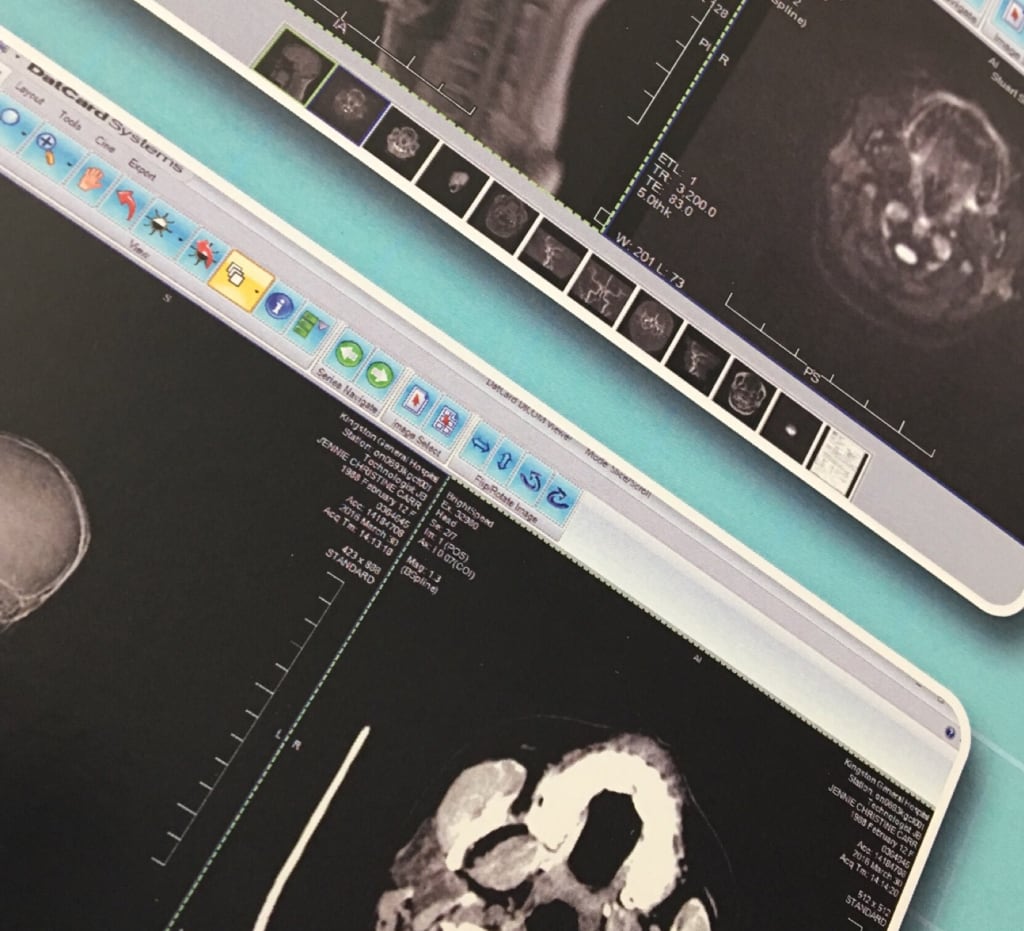15 Things They Don’t Tell You About Brain Surgery
Getting Down to the Nitty Gritty of Brain Surgery Aftermath

Warning: adult language ahead (you are allowed to swear when you've had brain surgery).
Nobody tells you what it’s like to have brain surgery. I mean, why would they? Nobody expects to have brain surgery, and most people don’t know a lot of people who have had encountered this unfortunate scenario. It’s not your typical topic of conversation. So, when it happens to you, you really don’t know what to expect. I’m here to tell the future brain surgery warriors and the families of the brain surgery warriors the obvious and not so obvious on the topic.
1. You will be so tired you won't want to do anything but sleep.
You thought being up with a newborn all night was rough? Try having brain surgery. There is a thing called brain tired, and it's different from the average tired that comes along with normal life. Being a nighthawk as a teenager, and being an exhausted mother, has nothing on brain surgery. When you do sleep, it's broken sleep because so many people are poking and proding you and asking you questions, and then add in being in the third trimester of pregnancy along with everything else. It all adds up to being lucid for about three hours of the day, if that.
2. You will be in pain and will feel like you just got run over by a truck.
Pain meds won't take all the pain away, not for a while at least. The staples pushing into your skull as you try to get any sleep whatsoever between the wake up calls from nurses and doctors 24/7 will make your already excruciating headache a lot worse. The incision will be sore for weeks and tender for months. Plus, your matted hair in the back of your head will form into a rock and will start resembling a rat's nest. They must put a glue-like substance on your hair during surgery because there was no way I could have gotten a comb through that mess. And I tried hard. My sisters and mom and the nurses tried hard. I felt so defeated when they finally had to chop it off. On top of that, pain will be other pain. You will be stuck in bed all day, and, when you do move, your whole body will ache, plus your throat will hurt from the breathing tube during surgery. Your arms will be tender from the IVs, the constant blood tests, and getting blood-thinner needles. And the PICC line will be sore, too. I had bruises covering my arms.
And that's just the physical pain. Emotional pain from a debilitating experience will also take a toll on your body.
3. You will feel alone.
Nobody you know has gone through what you just went through. Nobody will understand what you are feeling. Hell, half the time you don't even know what you are feeling because you are in a fog-like state, partially because of all the narcotics they are pumping into you, but mostly because you just had fucking brain surgery. BRAIN SURGERY. Need I say more?
Even though I have never needed my mother more, and I had hundreds of people supporting me, sending me messages of love, and I had the very best family and friends you could ever ask for, I still have never felt more alone in my life.
4. Brain surgery will have you questioning if there is now something wrong with your brain.
There was an occupational therapist that performed an assessment on me to test cognitive abilities. I didn't think anything of it at first, but, as I got thinking, I started to get terrified of the results. There were several different parts of the test. To name a few, I had to recite the alphabet backward, draw a clock with the short hand,and long hand at certain times, repeat tongue twisters, identify different animals on the page, repeat a sequence of numbers, and draw 3D boxes and houses, like you would in elementary school. But, the worst was the OT asked me to remember five different objects and then explained that after the test was complete I would have to tell her what they were. I quickly made an acronym and repeated the objects in my head in between the tests. Fifteen minutes later, after the test was complete, I could only name four out of five objects. Being a Type A personality who is never happy with less than 100 percent, this outcome was devastating for me at that insanely messed up period of time. The OT explained that the majority of people wouldn't be able to name all five, but it made me question if something happened to my brain in the surgery. (A coworker later joked that he told my neurosurgeon to scrape a little more brain cells off when he was in there so we could be on the same intellectual playing field.) In the days following the assessment, I woke up and mentally said the five objects to myself, proving that I could remember, and I did. (Yes, that's how crazy you get when you live in the hospital.) Edit: Two years(ish) later, I can still remember those objects, although "green violin" gives me some trouble sometimes.
It also doesn't give you much confidence when every nurse has to ask you your name, what year it is, and where you are. Even when you know it's protocol, you still question if maybe one time they will casually walk in and ramble off the questions and all of a sudden I won't remember who I am. Yeah, again, it makes you crazy!
5. You will feel like a different person.
This thing called brain surgery will leave some damage in the way of saving your life. I was fortunate that the alternative didn't happen to me, but going through an event like this will change you forever. You will think completely differently, especially at the beginning of your recovery. I felt like the doctors should have all the answers, and, since I was followed by four different medical specialties (neurosurgery, obstetrics, infectious diseases, and neurology), I had intelligent minds at my fingertips to try to dig some information about how they thought my recovery would go. I was like a detective, dissecting every word and trying to sense some doubt or see if their tone of voice leaned towards "I believe you will never get your vision back" or "I totally think you will." It was like a points system. I would have all the pessimists on one side, the optimists on the other, and I would see who stacked up against who. This would totally determine how many hours I would sit and cry that day. That was my world—trying to figure out just how much I changed. Looking back, the game in itself already identified that shift in my perspective and how I analyzed the world around me. But, people are continuously changing, and going through the process of recovery will have you becoming a different person every day, if not every hour. It's like temporary schizophrenia.
6. How you think about time will be different, too.
Everything that happens in your life will either fall into the category of "happened before my brain surgery" or the category of "happened after my brain surgery."
7. You will lose your confidence.
You are a different person now, you don't know yourself anymore, so you don't have any faith in this new identity. You had already been through the bleak highschool years where you look back upon them and can't figure out for the life of you why those insecurities existed. All those years of building your confidence up were out the window. Think about it this way, as a 28 year old woman, I had a bachelor's degree in business, as well as an advanced diploma in human resources and a general arts and science diploma. I had worked hard to get to where I was professionally, and those pieces of paper that started my career became a major part of my identity. Strangers ask "so what do you do?" and I was proud to say "I'm a career advisor" and list off my education if they chose to investigate further. I was not only a professional, but also a homeowner, a wife, and a mother—all accomplishments that stacked up pretty well. These words were ingrained in my being. Those are the things that make me who I am, because that's what people want to know at surface level.
Who am I now? A patient... a sick person who is now disabled.
That's a hard pill to swallow, literally. I prided myself on being independent, doing it on my own and not asking anyone for help, and now I was helpless.
8. You will feel like you failed as a mother.
I was laying in a hospital bed and not taking care of my kids, the one at home or the one in utero. Technically, my body was focused on Marlee and making sure she was okay, but I was allowing cat scans and MRIs with dye to be done on my brain, even though pregnant woman aren't recommended to have these tests because it could be dangerous for the fetus. (I couldn't be too hard on myself, though, because without the scans I would be dead.) I also wasn't eating properly and had gone days without any food, and I wasn't exercising and preparing my body for a safe labour.
The doctors also didn't know how I would deliver the baby. Some doctors said it would be dangerous to deliver naturally; some said it would be dangerous to have a cesarean section; some said I wouldn't be able to have an epidural. It was all very confusing. If I can't have a vaginal or cesarean delivery, what alternative did I have? I'm not an anatomy major, but I'm pretty sure those are the only two options.
And Maddie: Maddie was a mommy's girl. I had gone back to work part-time after my maternity leave with her so I could spend as much time with her as possible. She had never been away from me for more than a night (and that only happened twice). She was only one-and-a-half-years-old, but she was talking so well already and was smart as a whip. She would know mama was gone. I will never forget when she saw me in the hospital for the first time. She came walking in with Tyler and had a puzzled look on her face and said, "Oh, hi mama." I broke down crying, and she was so confused. She smelled different, and because my vision was so blurry I could barely recognize her.
What would she think of me for abandoning her? I was terrified she would forget about me. I was sad that I had missed so much and could never get that time back. I was heartbroken to think I wasn't mommy during this time and potentially never the same mommy again.
I worried that I wouldn't be able to care for my kids anymore. How could I make dinner and clean the house and read stories and go for walks? I remember crying to my mom and telling her I probably couldn't even change a diaper, to which she said, "You would never leave your baby dirty. You will be able to do it. You will be the mother you have always been." But did I believe her? Absolutely not.
9. You will be jealous of the people around you.
Have you ever heard of the iceberg analogy? What you see on the surface is so miniscule compared to what is hidden underneath.
In this social media world, where people can keep their struggles and not so favourable moments concealed, and broadcast their perfect life for all of their Facebook "friends" and Twitter "followers" to see, it makes it pretty difficult for someone who just missed death by a hair.
This inaccurate representation of real life and happiness can make someone living in a nightmare feel the most severe heartache you could ever imagine.
I avoided social media the majority of time, but, in the middle of the night, reality set in hard. Tyler snoozed beside me in a cot that became his home base for sleep all those weeks. That little cot right up against my hospital bed was trying to deceive us into thinking it was our comfy bed we have slumbered in for the years before. The blankets from home weren't disguising the plastic safety bed rails and all the buttons that made the legs and head of the bed go up and down (I hated the legs up, and don't understand how anyone would be comfortable in that position). Looking at my hospital room and hearing the screams of other patients on the floor, I admit I scrolled through at times. Seeing friends go out to restaurants for dinner and go on trips and have the times of their lives sent me into fit of tears. I wanted to live in that world, the one I had lived in before. I wanted to advertise the snapshots of the enjoyable moments in my life, like everyone else who created a page. But there was no joy for me. It was hard for me not only because I felt like I was missing out, but also because it was more difficult to read and recognize faces as well, and that hurt even more.
And I wasn't just jealous of those fake lives, but also the lives of the people who came in and out of the hospital to see me. My family could escape the smells and sounds of those four walls I lived in. I didn't go outside for weeks. I was trapped, and everyone else got to go to their own homes and not think about this fucking brain injury, if only for a moment.
10. You will feel like you are never going to get through it.
You will feel like you will be laying in a bed for the rest of your life, surviving but barely living. Every day Tyler told me we would get through it. My sister, Katie, and my mom encouraged me to believe it would get better and to take it one day at a time. My mother in law, Sandra, would say she could see me improving every day.
In my mind, I didn't think it was the truth and also didn't think they believed it was the truth either.
I had a list in my head of all the things I would never be able to do again. The list was pretty extensive and didn't leave much left to put on the "will be able to do" list.
I couldn't get through my recovery and move forward from what happened to me because I felt like I could never manage the daily activities of life, now that my abilities had changed.
11. The entire experience will feel surreal.
You will retrace every step trying to make sense of what happened to you and pinpoint a reason and exactly how your illness happened. They were doing so many tests trying to figure out the source of the abscess and never found the answer. I used to question constantly if I caused this and put both mine and my daughter's lives in danger. I remember asking one of the doctors if the cause could have been my increase in exercise (I had been doing squats everyday, trying to stay fit for when Marlee was ready to make an appearance). Looking back, that seems like such a silly question, but during the time I asked a lot of silly questions.
It didn't feel real. How could it? I went from my everyday, happy life to this misery.
I talked with a social worker, who had also spoken with many of my family members for support. When we chatted, she said most people in similar situations think about those details over and over again and try to figure out what happened and if they did something wrong. Was it the horrible cold I had weeks before? Did I have a sinus infection that I should have gone to the doctor to treat? Was it the exercise that put a strain on my faulty heart? (They found a hole in my heart, a weak wall, and a floppy valve when they were doing all the tests.) Was it from not flossing enough? Or did I have gum disease, even though I had no pain? Was it an ear infection I didn't know I had? She said I would drive myself crazy thinking about the possibilities and that I needed to learn to not be so hard on myself. All I could think at the time is how I could have prevented this from happening, but what would that thinking change? Nothing. I can't magically go back and alter reality, and even if I could I don't know what I would do differently.
I felt like I was in a nightmare that I couldn't wake up from. How could all this messed up shit be real? It couldn't be genuinely true.
12. You will learn how good people are.
I had hundreds of messages pouring in, sending me and Tyler and my family support. It's a humbling experience to witness how many people really care about your well-being. It makes you want to keep fighting when you see how much you are loved. These amazing people were genuinely worried about me and wanted me to get better. I heard about so many people who didn't even know me but were praying for me, that thought about me every day, that believed I would survive and knew in their hearts I would recover and live with my little family again. They spoke about how their hearts sunk when they read what happened to me, and maybe they even shed a tear for me. I had read about similar tragedies in the past and knew that pit-in-your-stomach feeling well, but these people reached out. Some of the private messages I received were paragraphs long. They encouraged me, they opened up and told me their own struggles, and they divulged how much I meant to them or how I made them feel, even if I didn't know them extremely well. They were kind. These messages, along with so many other acts of kindness, protected me by lighting a match in the darkest of days.
I am still floored about the amazing support I received during the worst time in my life. Seeing the Facebook memories pop up and show all the love reminds me to keep bettering myself, to try to live in the moment and to love the people I love and to make people feel some happiness, even if it's just a compliment here and there. I've shed many tears (not quite sure if it's of happiness or of sadness—probably both) reading these comments and posts. It's kind of like being a fly on the wall at your own funeral. You find out what people would say about you if you were no longer around, but you actually get to live and continue living, knowing how people feel about you. I wish everyone could feel the way I do, knowing hundreds of people actually care about them.
13. Modesty goes out the window.
Many people will see you naked. You won't give a fuck. What more can I say?
14. You will want to give up, but you won't.
People will tell you that you are strong, but you won't believe it. You will think it's a bald-faced lie because every day you want to pack things in, curl up in a ball, and stop fighting for life. Was life worth living now? I felt like I would be a burden, and everyone would be better off without me. Maddie didn't need me. Tyler didn't need me. My family didn't need me. I had more thoughts like that, it seemed, than moments where I felt like I could handle the situation I was in. So I felt like an imposter when everyone would say I was strong. I not only felt physically and emotionally weak, but also mentally weak.
But, with every negative thought running through my brain, I had alternative ones that falsified my initial thinking. I would get better. My recovery might be slow, but I will improve and adjust and reestablish some normalcy. Maddie did need me. This baby growing inside me needed me. Tyler needed me and my family did, too. I wouldn't be a burden, and the people I love want to sacrifice in order to help me. Even if it's extremely hard, and they have to see me at my worse, and they have no hope at making me smile that day, they still want to be there. All of these things pushed me forward. And, even if I couldn't understand how I would get there, I would tell myself I had the ability to be happy again. So, I just tried to get through one day at a time, sometimes one hour at a time, and not think too much about what was to come. I didn't give up because I had too much to give up on. I didn't want to hurt my family, and I didn't want to lose all of the amazing things I had to live for.
15. You will have the strength of a warrior.
You will be resilient. You will adapt to your new reality. You will laugh again. You will love yourself again. You will love your life again. You will never forget the pain. You will never forget what has been taken from you, but you will start to move on. You will no longer think about the surgery every day. You will no longer cry every day. You will no longer test yourself every morning to see if you've gained any sight back. You will no longer be terrified to leave your house. You will surprise yourself with how fast you recover and resume living. You will live because the ones around you need you. You will live because you need to. You will live because it's okay to grieve the past and step into the future. You will live because you survived what tried to kill you.
About the Creator
Jennie Carr
I’m a mom of two and a brain surgery survivor. My husband has Type 1 Diabetes, my oldest daughter has Celiac Disease and my youngest has Duane Syndrome. Writing allows me to share my journey of recovery, acceptance and self-discovery.






Comments
There are no comments for this story
Be the first to respond and start the conversation.